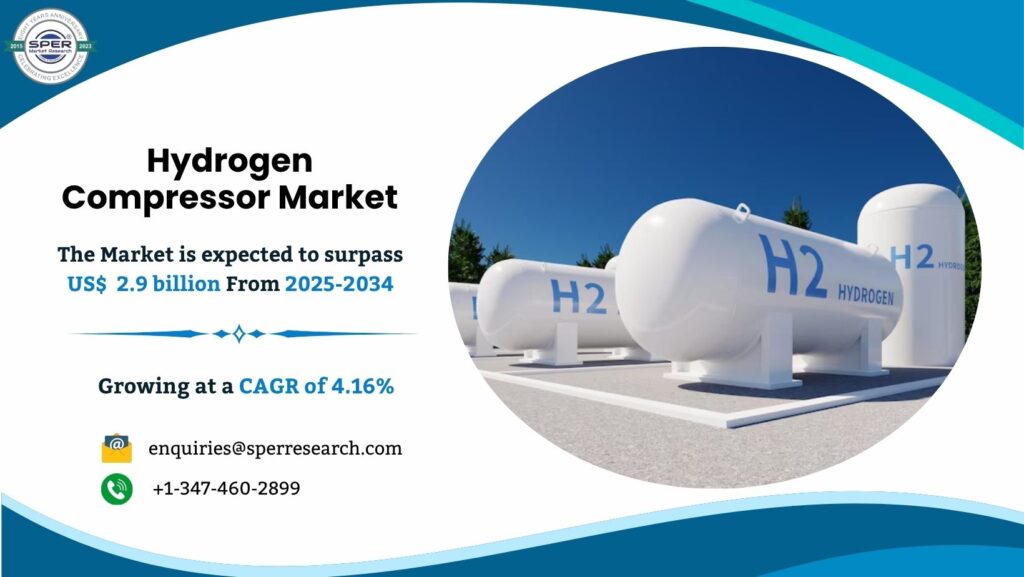
A hydrogen compressor is a machine made to raise the pressure of hydrogen gas for transportation or storage. The hydrogen fuel industry depends on hydrogen compressors because compressed hydrogen gas is more portable and takes up less space than uncompressed hydrogen gas. The hydrogen compression units are an essential component of this shift since they make it possible to store and move hydrogen in a secure and effective way. The advancement of hydrogen technology has accelerated recently on a global basis. Among all fuels, hydrogen has the most energy per unit weight. Hydrogen only has a density of 90 grams per cubic meter in atmospheric conditions. To achieve usable energy density levels, compression needs to be effective.
According to SPER Market Research, ‘Global Hydrogen Compressor Market Growth, Size, Trends Analysis – By Lubrication Type, By End User- Regional Outlook, Competitive Strategies and Segment Forecast to 2034’ state that the Global Hydrogen Compressor Market is predicted to reach 2.9 billion by 2034 with a CAGR of 4.16%.
Drivers:
Growing expenditures in clean energy transportation are driving the construction of hydrogen refueling infrastructure, which offers a substantial opportunity for the hydrogen compressor industry. Globally, governments and commercial organizations are speeding up the installation of green gas stations to accommodate industrial and fuel cell car uses. To build a refueling station in Bayport, for example, the U.S. This project aims to provide pipeline-based truck fuelling choices, which will enhance supply chain growth throughout Texas and the Gulf Coast. Large-scale hydrogen corridors are being developed in Europe and Asia, with similar developments happening in both regions. Due to the increasing demand for high-pressure, efficient compressors from this expanding infrastructure, there are significant prospects for market expansion.
Request a Free Sample Report: https://www.sperresearch.com/report-store/hydrogen-compressor-market?sample=1
Restraints:
The expensive initial investment costs of hydrogen compressors continue to be a major barrier to the global market. Manufacturing, installing, and maintaining advanced compression systems—especially high-pressure and oil-free models—requires a significant financial investment. Due to these expenses, small and medium-sized businesses may find it difficult to join the hydrogen supply chain. Moreover, the cost is increased by the construction of infrastructure, such as refueling and storage facilities. Although government subsidies and technology developments are meant to lower costs over time, the present financial situation hinders widespread adoption, which has an effect on the expansion as a whole. Systems for hydrogen compressors need a large initial outlay of funds, which includes infrastructure construction, equipment acquisition, and installation. The first one is the cost of purchasing the equipment needed for hydrogen compression, which includes the cost of hydrogen compression. The global market leader for hydrogen compressors is Asia Pacific. The region has the highest levels of hydrogen generation and consumption. Some of its key players are – Hitachi Ltd, Burckhardt Compression Holding AG, IDEX CORPORATION, HAUG SAUER KOMPRESSOREN AG, and Chart Industries, Inc (Howden Group).
For More Information, refer to below link: –
Hydrogen Compressor Market Share
Related Reports:
Follow Us –
LinkedIn | Instagram | Facebook | Twitter
Contact Us:
Sara Lopes, Business Consultant — USA
SPER Market Research
enquiries@sperresearch.com
+1–347–460–2899





